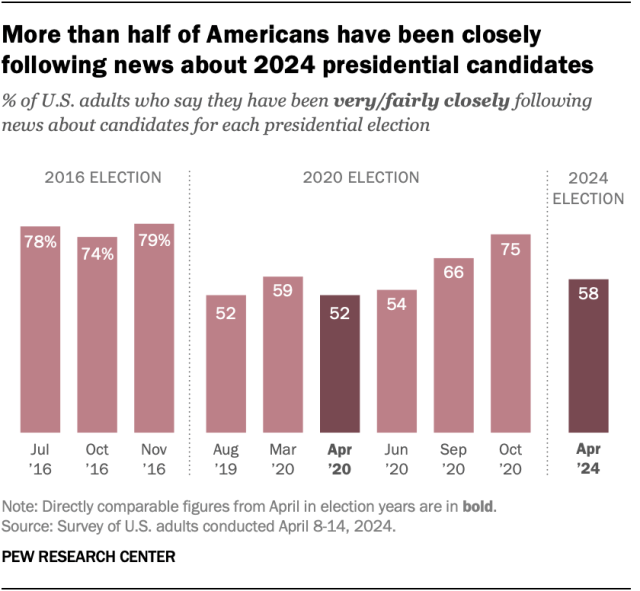☀️ Happy Thursday! The Briefing is your guide to the world of news and information. Sign up here!
In today’s email:
- Featured story: AP expands collaborations with nonprofit local outlets
- New from Pew Research Center: Our first look at Americans’ experiences with 2024 election news
- In other news: BBC to launch review of how it represents communities across the UK
- Looking ahead: Vox Media and The Atlantic sign licensing deals with OpenAI
- Chart of the week: How current attention to presidential election news compares with 2020 and 2016
🔥 Featured story
The Associated Press has announced new partnerships with nonprofit local news outlets to share and distribute content ahead of the 2024 U.S. elections. The newsrooms will distribute AP reports to their local communities for free, and The AP can share local coverage with its licensed media partners.
Nonprofit news organizations play an increasingly important role in covering politics at the state level. According to a 2022 Pew Research Center study, nonprofit news outlets are now the second-largest employer of statehouse reporters, following newspapers. One-in-five statehouse reporters in the U.S. worked at a nonprofit news organization in 2022, up from just 6% in 2014.
🚨 New from Pew Research Center
A new Pew Research Center survey looks at how closely Americans are following news about the 2024 presidential candidates.
Among the key findings:
- Older Americans are much more likely than young adults to say they are following election news closely.
- A majority of U.S. adults (62%) say they feel worn out by the amount of election coverage, although those who are following election news closely are less likely to say this.
- Americans are more likely to say they mostly get political news because they happen to come across it (57%) than because they are looking for it (42%).
- A majority of U.S. adults (62%) say they get most political and election news from journalists and news organizations rather than other sources.
📌 In other news
- BBC to launch a review of how it represents “different groups and communities” across the UK
- How influencers in South Africa are using TikTok to encourage voting
- Meta says it has found networks pushing deceptive content likely generated by AI
- Iran says six of its state media journalists were expelled from Saudi Arabia ahead of Hajj
- New hedge fund aims to use investigative reporting to profit off the stock market
- One of two California bills seeking to support local journalism dies after tech industry lobbying
📅 Looking ahead
Vox Media and The Atlantic have signed licensing deals with OpenAI, allowing their content to be used to train AI models and generate responses to users’ questions. These deals are part of a broader trend of OpenAI partnering with news organizations as the tech company seeks to avoid copyright lawsuits. As part of the agreements, content from the two publications will include attribution links when cited in ChatGPT.
Overall, 54% of Americans say artificial intelligence programs that generate text and images – like ChatGPT – need to credit the sources they rely on to produce their responses, according to a Center survey conducted earlier this year. A much smaller share (14%) say the programs don’t need to credit sources, while about a third (32%) say they’re not sure.
📊 Chart of the week
This week’s chart comes from our latest analysis of Americans’ attention to election news. A majority of U.S. adults (58%) said in an April survey that they have been following news about the presidential candidates very or fairly closely, slightly higher than the share who said the same in April 2020 (52%). During the last election cycle, attention increased closer to Election Day.
👋 That’s all for this week.
The Briefing is compiled by Pew Research Center staff, including Naomi Forman-Katz, Jacob Liedke, Sarah Naseer, Christopher St. Aubin, Luxuan Wang and Emily Tomasik. It is edited by Katerina Eva Matsa, Michael Lipka and Mark Jurkowitz, and copy edited by Rebecca Leppert.
Do you like this newsletter? Email us at journalism@pewresearch.org or fill out this two-question survey to tell us what you think.
